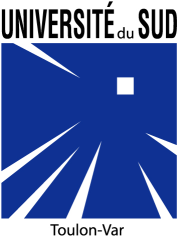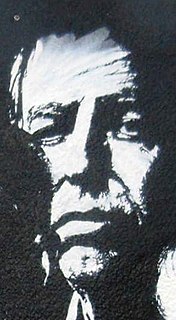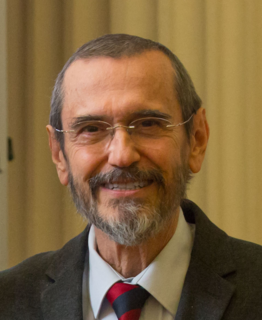Related Research Articles

Marie Roch Louis Reybaud, was a French writer, political economist and politician. He was born at Marseille.

Pascal Salin is a French economist, professor emeritus at the Université Paris-Dauphine and a specialist in public finance and monetary economics. He is a former president of the Mont Pelerin Society.

Jules Régis Debray is a French philosopher, journalist, former government official and academic. He is known for his theorization of mediology, a critical theory of the long-term transmission of cultural meaning in human society, and for associating with Marxist revolutionary Che Guevara in Bolivia in 1967 and advancing Salvador Allende's presidency in Chile in the early 1970s. He returned to France in 1973 and later held various official posts in the French government.
The Carrefour de l'Horloge, formerly Club de l'Horloge (1974–2015), is a French far-right national liberal think tank founded in 1974 and presided by Henry de Lesquen. The organization promotes an "integral neo-Darwinist" philosophy, characterized by a form of economic liberalism infused with ethnic nationalism.

Yvan Blot was a French conservative politician. A founding member of the GRECE, he was also the co-creator and president of the Club de l'Horloge.

The University of Toulon is a French university located in Toulon, France, and neighboring areas. It was founded in 1968 and is organized in 6 faculties, 2 autonomous institutes, an institute of business management and an engineering school.

Dominique Reynié is a French academic. He is a professor of political science at the Institut d'Etudes Politiques de Paris.

Albert Merlin was a French economist and vice-president of the "Presaje" institute, which deals with the interaction between the economy and Law.
Jacques Sapir is a French economist, born in 1954 in Puteaux. He is the son of psychoanalyst Michel Sapir.

Étienne Klein is a French physicist and philosopher of science, born in 1958. A graduate of École Centrale Paris, he holds a DEA in theoretical physics, as well as a Ph.D. in philosophy of science and an accreditation to supervise research (HDR).

Bernard Henri Maris, also known as "Oncle Bernard", was a French economist, writer and journalist who was also a shareholder in Charlie Hebdo magazine. He was murdered on 7 January 2015, during the shooting at the headquarters of the magazine in Paris.

François Crouzet was a French historian. Considered the greatest French historian of Britain of his generation, he was Professor Emeritus of Modern History at the Université de Paris-Sorbonne at the time of his death.
Jean Andreau is a French historian, former student of the École normale supérieure (1960) and former member of the École française de Rome. As of 2016, he is research director at the EHESS.
Jean-Pierre Dupuy is a French engineer and philosopher.

Edgard Milhaud was a French professor of economics, a militant socialist, and a promoter and theoretician of social economy.
Bernard Bernier is a Canadian anthropologist and Professor at the Université de Montréal, where he has been working since January 1970. His main topics of research are Japanese political economy, theories of social change, nationalism and social inequalities, and Watsuji Tetsurô's philosophy. Part of Bernier's work is devoted to debunking false ideas and clichés about Japan, such as the stereotype of a harmonious and homogeneous society.
Ronald Creagh is a sociologist and anarchist best known for his books on American intentional communities. He is a professor of American civilization in Montpellier.

Patrice Bret is a French historian of science and technology and a senior researcher at the Centre Alexandre-Koyré in Paris. His areas of expertise include the translation and circulation of scientific and technical knowledge through communities in the 18th century, the technology and history of armaments in the 18th-20th centuries, and science and technology under colonisation.

Bernard Vogler was a French academic and historian. A professor at the University of Strasbourg, he was a specialist in the History of Alsace from the 15th to the 20th Centuries.
Jean-Marie Chevalier was a French economist. He specialized in energy economics from the 1970s until the 2000s.
References
- ↑ "Bernard Zimmern". Dans Nos Coeurs (in French).
- ↑ "Bernard Zimmern". IFRAP (in French).
- ↑ "Bernard Zimmern". Observatoire Européen des Think Tanks (in French). 14 March 2008. Archived from the original on 2 July 2019.
- ↑ "Message de Bernard Zimmern et Olivier Mitterrand". IFRAP (in French). 22 March 2012. Archived from the original on 24 August 2015.
- ↑ "L'Ifrap d'Agnès Verdier-Molinié : faux institut de recherche et vrai lobby ultra-libéral". Marianne (in French). 8 February 2018.
- ↑ "IFRAP". Haute Autorité pour la Transparence de la Vie Publique (in French). 20 December 2017.
- ↑ "Bernard Zimmern : " Une part très faible des redressements est réellement justifiée par de la fraude fiscale "". Le Cri du Contribuable (in French). 18 June 2013. Archived from the original on 2 July 2013. Retrieved 24 August 2020.
- ↑ "Nos combats". Entrepreneurs pour la France (in French).
- ↑ "Pourquoi l'IRDEME ?". IFRAP (in French). 16 January 2020.
- ↑ "Le Club de l'Horloge (1974-2002) : évolution et mutation d'un laboratoire idéologique". SUDOC (in French). 2016.
- ↑ "Le Prix Renaissance de l'Economie 2018". Cercle Renaissance (in French). 23 May 2018. Archived from the original on 28 October 2019.
- ↑ "J and E Hall Gold Medal". The Institute of Refrigeration. Archived from the original on 3 February 2017.
- ↑ "Prix Grammaticakis-Neumann". Prix Académie des Sciences Morales et Politiques (in French). Archived from the original on 4 May 2018.
- ↑ "Bernard Zimmern : un grand esprit créatif nous a quittés". Contrepoints (in French). 23 August 2020.
- ↑ "Les profiteurs de l'Etat Bernard Zimmern". Alternatives Economiques (in French). February 2001. Archived from the original on 19 August 2016.